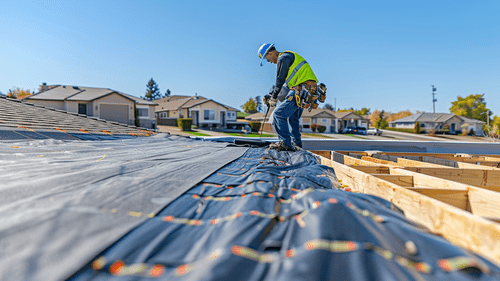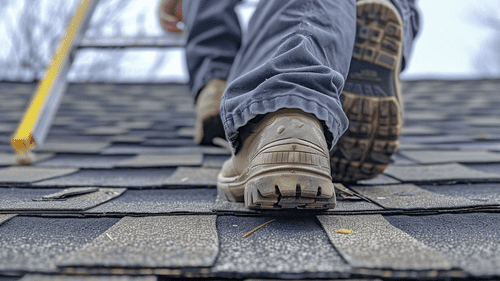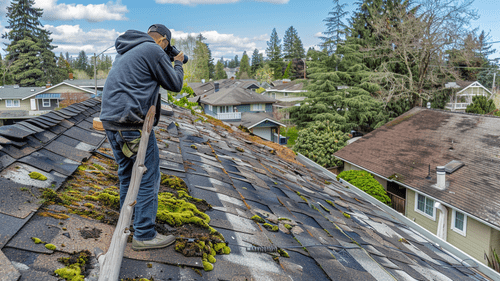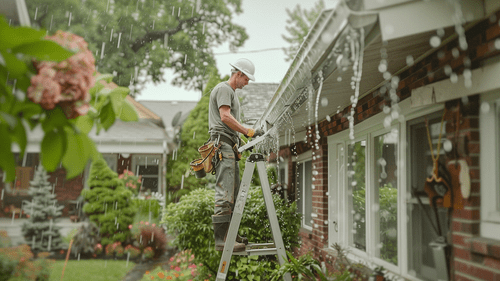Navigating the world of roof replacement can be daunting, especially with the prevalence of high-pressure sales tactics. Many homeowners find themselves rushed into decisions, often swayed by scare tactics or deals that seem too good to be true. Recognizing if you're being pressured is crucial, and there are steps you can take to ensure you're making the best decision for your home.
In this guide, we'll explore how to identify these high-pressure tactics and equip yourself with the knowledge needed to make informed choices. From understanding different roofing options to finding trustworthy professionals, we'll cover everything you need to know to protect yourself from scams and ensure a smooth roof replacement process. Ready to take control of your roofing project without the stress? Let's get started.
Identifying High-Pressure Sales Tactics
Common Red Flags
High-pressure sales tactics are a significant concern in the roofing industry. Recognizing these tactics can save homeowners from making rushed and potentially costly decisions. One of the most prevalent red flags is the attempt to rush decisions. Sales representatives may create a false sense of urgency, suggesting that immediate action is necessary to secure a special deal or to prevent further damage. This tactic preys on the homeowner's fear and lack of knowledge, pushing them to make hasty decisions without adequate research (source).
Scare tactics are another common method used to pressure homeowners. Sales reps might exaggerate the extent of damage or the potential risks of not addressing the issue immediately. They may use alarming language to instill fear, making the homeowner feel that their safety or the integrity of their home is at risk. This approach can lead to unnecessary repairs or replacements, ultimately costing the homeowner more money (source).
Confidence tricks involve the salesperson projecting an air of authority and expertise to gain the homeowner's trust. They might use technical jargon or present themselves as the only solution to the problem, discouraging the homeowner from seeking second opinions or doing their own research. This tactic can be particularly effective if the homeowner feels overwhelmed by the complexity of roofing issues (source).
Suspiciously Good Deals
Offers that seem too good to be true often are. Suspiciously good deals should be approached with caution. Trusted roofers will provide accurate quotes based on a thorough assessment of the roof's condition. If a quote is significantly lower than others, it may indicate subpar materials, inadequate labor, or hidden costs that will emerge later. Homeowners should be wary of deals that require immediate commitment or large upfront payments, as these can be signs of a scam (source).
Personal Stories and Testimonials
Real-life anecdotes can illustrate the impact of high-pressure sales tactics. For instance, a homeowner might share how they were pressured into signing a contract on the spot, only to later discover that the work was unnecessary or poorly executed. Testimonials from those who have experienced these tactics firsthand can serve as powerful reminders to remain vigilant and take the time to make informed decisions (source).
Equipping Yourself with Knowledge
Researching Roofing Options
Understanding the different roofing materials, costs, and benefits is crucial for making informed decisions. Roofing materials vary widely in terms of durability, cost, and aesthetic appeal. Common options include asphalt shingles, metal roofing, clay tiles, and slate. Each material has its own set of advantages and disadvantages, and the best choice will depend on factors such as the climate, the home's architecture, and the homeowner's budget.
- Asphalt Shingles: Affordable and easy to install, but may have a shorter lifespan compared to other materials.
- Metal Roofing: Durable and energy-efficient, but can be more expensive upfront.
- Clay Tiles: Long-lasting and aesthetically pleasing, but heavy and may require additional structural support.
- Slate: Extremely durable and attractive, but also the most expensive and difficult to install.
Using Reliable Sources
Leveraging reliable sources like Consumer Reports can provide unbiased information on roofing options and contractors. Consumer Reports offers ratings, pricing, and performance data for various roofing materials, helping homeowners make informed choices based on features that matter most to them (source). Using such resources can prevent homeowners from falling prey to biased or misleading information provided by sales representatives.
Questions to Ask Potential Roofers
Asking the right questions can help gauge the reliability and professionalism of a roofing contractor. Key questions include:
- Are you licensed and insured? Ensuring the contractor has the necessary credentials protects the homeowner from liability in case of accidents or damage.
- Can you provide references? Speaking with previous clients can give insight into the contractor's work quality and customer service.
- What is your experience with this type of roofing material? Experience with specific materials can affect the quality and longevity of the installation.
- What is the estimated timeline for completion? Understanding the project timeline helps manage expectations and plan accordingly.
- What warranties do you offer? Knowing the warranties on materials and workmanship can provide peace of mind and protect against future issues (source).
Finding Trustworthy Roofing Professionals
Hiring Guide Essentials
When hiring a roofing professional, several steps can ensure you choose a trustworthy contractor. Check the contractor's licenses and insurance. A licensed contractor has met the necessary requirements to perform roofing work, and insurance protects both the homeowner and the contractor in case of accidents or damage.
Next, ask for references and follow up with them. Speaking with previous clients can provide valuable insights into the contractor's reliability, work quality, and customer service. Additionally, check online reviews and ratings on platforms like the Better Business Bureau (BBB) to see if there are any unresolved complaints or consistent issues (source).
Evaluating Quotes and Estimates
Interpreting and comparing quotes is essential to ensure you're getting a fair deal. A detailed quote should include the cost of materials, labor, and any additional expenses such as permits or disposal fees. Be wary of quotes that are significantly lower than others, as they may indicate the use of subpar materials or hidden costs.
It's also important to understand the payment terms. Avoid contractors who require large upfront payments or full payment before the work is completed. A reasonable payment schedule typically involves a deposit, progress payments, and a final payment upon completion and inspection of the work (source).
Recognizing Integrity and Stewardship
Reputable roofing companies prioritize customer service and ethical practices. Traits of trustworthy contractors include transparency, clear communication, and a commitment to quality. They will provide detailed estimates, answer questions thoroughly, and ensure the homeowner understands the scope of the project.
Integrity and stewardship are reflected in the contractor's approach to business. They will not use high-pressure sales tactics or scare tactics to secure a job. Instead, they will focus on building trust and providing value to the homeowner. Look for contractors who are involved in the community and have a track record of ethical behavior (source).
Protecting Yourself from Scams
Common Roofing Scams
Understanding common roofing scams can help homeowners avoid falling victim to fraud. One prevalent scam involves storm chasers—contractors who follow severe weather events and offer quick, cheap repairs. These contractors often do subpar work and disappear before issues arise (source).
Another scam is the door-to-door salesperson who claims to have leftover materials from a nearby job and offers a significant discount. This tactic is designed to pressure the homeowner into making a quick decision without proper research (source).
Due Diligence Practices
Verifying the legitimacy of a roofing company before signing any contracts is crucial. Start by checking the company's credentials, including licenses and insurance. Verify their physical address and contact information. Look for reviews and ratings on reputable platforms like the BBB and Consumer Reports (source).
It's also wise to get multiple quotes and compare them. This not only helps ensure you're getting a fair price but also allows you to gauge the professionalism and reliability of different contractors. Take the time to read the contract thoroughly and ensure all terms are clearly defined (source).
Legal Recourse and Consumer Protection
If you suspect you've been scammed, there are steps you can take to seek recourse. Contact consumer protection agencies, such as the Federal Trade Commission (FTC) or your state's attorney general's office, to report the scam and seek guidance on next steps. Additionally, consider consulting with a lawyer to explore legal options for recovering any losses.
By staying informed and vigilant, homeowners can protect themselves from scams and ensure a smooth roof replacement process (source).
Wrapping Up: Navigating Roof Replacement with Confidence
Navigating the roof replacement process doesn't have to be stressful. By recognizing high-pressure sales tactics, such as scare tactics and suspiciously good deals, homeowners can avoid making rushed decisions. Equipping oneself with knowledge about roofing materials and asking the right questions can ensure that you make informed choices. Trustworthy roofing professionals prioritize transparency, quality, and ethical practices, providing peace of mind and reliable service.
Protecting yourself from scams involves due diligence and understanding common pitfalls. By leveraging reliable sources and verifying contractor credentials, you can safeguard your investment and ensure a smooth roof replacement process. Remember, the integrity of your home is crucial—don't let high-pressure tactics compromise it. Stay informed, trust your instincts, and make decisions that best serve your home and family. After all, a well-informed homeowner is the best defense against roofing scams.







